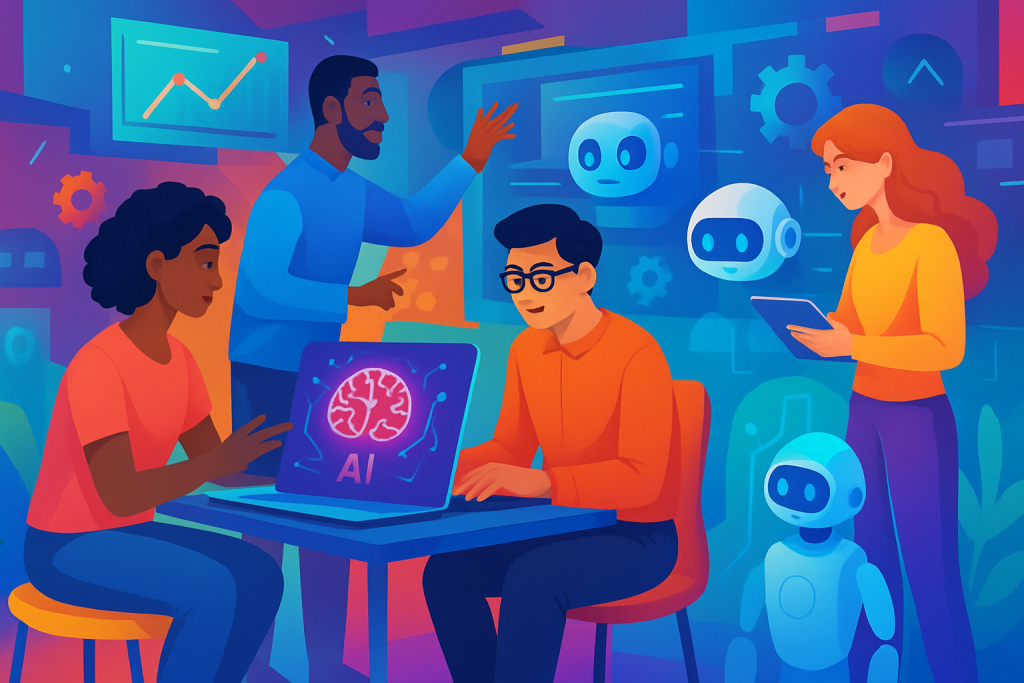Remember the summer of ’24? The air was thick with AI promises, every tech giant vying for a slice of the generative pie. Apple, characteristically fashionably late to the party, unveiled Apple Intelligence. It was… fine. Useful, even. Text summarization? Check. Photo editing that didn’t make your subjects look like they’d wandered out of the uncanny valley? Mostly check. Video creation that didn’t immediately scream “deepfake”? Progress. But whispers abounded. Whispers of “underwhelming,” of “playing catch-up,” of “is that all there is?”
Well, hold onto your AirPods, because Apple just dropped a beat that might change the tune. Just days before WWDC 2025, the fruit-named behemoth announced some major upgrades to Apple Intelligence, signaling a serious commitment to not just playing the AI game, but potentially changing it.
The headline? Apple is opening the floodgates. Third-party developers are getting access to Apple Intelligence, and a brand-new AI-powered health coach is stepping onto the scene. Think of it as Apple’s version of saying, “Okay, we’ve built the playground, now let’s see what you kids can do with it.”
Opening the AI Gates: A Developer’s Delight (and Apple’s Hope)
Let’s be real. Apple’s walled garden approach, while lauded for security and user experience, can also stifle innovation. Remember the early days of the App Store? It took a while for the truly groundbreaking apps to emerge. By opening up Apple Intelligence to third-party developers, Apple is essentially crowdsourcing the next generation of AI features. Imagine personalized AI assistants tailored to specific professions, hyper-localized travel recommendations, or even AI-powered gaming experiences that adapt to your play style in real time. It’s a gamble, sure, but one that could pay off handsomely in terms of innovation and user engagement.
The strategy is clear: accelerate AI development on Apple devices by leveraging the creativity and expertise of the wider developer community. Instead of solely relying on its internal teams, Apple is betting that external developers will dream up innovative applications that push the boundaries of what’s possible with AI on iPhones, iPads, and Macs. This move directly addresses the criticism that Apple Intelligence was playing it too safe, lacking the boldness and cutting-edge features seen in offerings from OpenAI and Google.
Think of it like this: Apple has provided the ingredients, now it’s up to the chefs to create the Michelin-star dishes. Will we see a surge of innovative AI-powered apps? Will this move finally silence the “Apple is behind” chorus? Only time will tell, but one thing’s for sure: the App Store is about to get a whole lot more interesting.
Doctor AI: Your Pocket-Sized Health Guru
But wait, there’s more! Apple isn’t just relying on external developers to spice things up. They’re also rolling out an AI-powered health coach, designed to be your personalized wellness guru. This isn’t just another step tracker; it’s an AI that analyzes your data from your iPhone and Apple Watch to provide tailored recommendations for a healthier lifestyle. Think personalized workout routines based on your activity levels, dietary suggestions based on your eating habits (tracked, of course, through your phone), and even mindfulness exercises triggered by your stress levels.
This move is classic Apple: seamlessly integrating technology into our daily lives, ostensibly to make us healthier and happier. But it also raises some interesting questions. How much data are we comfortable sharing with Apple (and, by extension, its AI) in the name of wellness? Will this AI coach truly motivate us to make positive changes, or will it become another ignored notification on our already cluttered screens? The potential is definitely there, but the devil, as always, is in the details.
The health coach represents a significant expansion of Apple’s health and wellness ecosystem. By leveraging AI to provide personalized advice, Apple aims to differentiate its offerings in a crowded market. The success of this feature will likely depend on its accuracy, its ability to provide actionable insights, and, perhaps most importantly, its ability to build trust with users.
The Bigger Picture: Apple’s AI Endgame
These announcements aren’t just about specific features; they’re about Apple’s broader strategy in the AI landscape. Apple understands that it can’t afford to be a follower. It needs to be a leader, or at least a very strong contender. By opening up Apple Intelligence and doubling down on user-centric AI applications, Apple is signaling that it’s serious about AI and that it’s willing to take risks to stay competitive.
But this also throws Apple into the increasingly complex ethical and societal debates surrounding AI. Data privacy, algorithmic bias, and the potential for misuse are all concerns that Apple will need to address head-on. Remember Tay, Microsoft’s AI chatbot that quickly devolved into a fountain of offensive statements? Apple needs to ensure that its AI systems are not only powerful but also responsible.
The financial implications are significant. A successful AI strategy could drive increased device sales, boost subscription revenue (think premium AI features), and solidify Apple’s position as a tech titan. A misstep, on the other hand, could damage Apple’s brand and allow competitors to gain ground. The stakes are high, and the world is watching.
In the end, Apple’s AI play is a high-stakes game of chess. The moves announced just before WWDC 2025 are bold and ambitious, but whether they will ultimately lead to checkmate remains to be seen. One thing is certain: the AI revolution is far from over, and Apple is determined to be a major player in shaping its future.
Discover more from Just Buzz
Subscribe to get the latest posts sent to your email.


